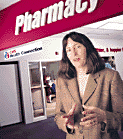“Pfizer and CVS share
a commitment to serving
our communities. By combining
resources, we can foster a
more integrated approach to
health care.” 
Tom Ryan,
President and CEO, CVS
|
Health Care – Pharmaceuticals (cont'd)Diabetes
Pfizer has long marketed leading sulfonylurea compounds that stimulate the pancreas to produce insulin in patients with Type 2 diabetes. Glucotrol XL, the leading branded agent in this category, achieved sales of $175 million in 1997.Two late-stage clinical programs in diabetes—inhaled insulin and Alond—aim to meet additional unmet needs of people with diabetes.
 An inability to achieve long-term blood sugar control can have devastating results. Diabetes is the leading cause of amputations, kidney failure, and blindness in the United States. Half of all people with diabetes will develop some form of nerve damage. The disease costs the U.S. health care system about $90 billion annually. An inability to achieve long-term blood sugar control can have devastating results. Diabetes is the leading cause of amputations, kidney failure, and blindness in the United States. Half of all people with diabetes will develop some form of nerve damage. The disease costs the U.S. health care system about $90 billion annually.
 Contributing to the high incidence of these complications is poor patient acceptance of, and compliance with, a regimen of multiple daily injections of insulin. About one million people with Type 1 diabetes and about 40 percent of the 7 million people diagnosed with Type 2 diabetes in the United States take insulin, which must be administered by injection. Pfizer and Inhale Therapeutic Systems, Inc., are now in Phase II testing of a device that allows patients to inhale much of their daily insulin requirements. To date, these clinical trials have indicated blood sugar control from inhaled insulin comparable to that of injected insulin. Contributing to the high incidence of these complications is poor patient acceptance of, and compliance with, a regimen of multiple daily injections of insulin. About one million people with Type 1 diabetes and about 40 percent of the 7 million people diagnosed with Type 2 diabetes in the United States take insulin, which must be administered by injection. Pfizer and Inhale Therapeutic Systems, Inc., are now in Phase II testing of a device that allows patients to inhale much of their daily insulin requirements. To date, these clinical trials have indicated blood sugar control from inhaled insulin comparable to that of injected insulin.
 Pfizer is also developing Alond, an aldose reductase inhibitor, to treat serious diabetic complications including nerve damage. Results to date indicate a significant improvement in nerve conduction velocity, a key measure of nerve function in diabetics. Pfizer is also developing Alond, an aldose reductase inhibitor, to treat serious diabetic complications including nerve damage. Results to date indicate a significant improvement in nerve conduction velocity, a key measure of nerve function in diabetics.
Allergies
In its second year on the U.S. market, Zyrtec advanced to second place in prescription antihistamine sales. Sales in the United States and Canada, where Pfizer has marketing rights to the compound, increased 81 percent to $265 million in 1997. Zyrtec is approved for treatment of seasonal and perennial allergic rhinitis and chronic urticaria (hives) in adults and in children 6 years of age or older. The product’s use in children age 2 to 5 is under FDA review. A formulation of Zyrtec with the decongestant pseudoephedrine is in advanced development. Zyrtec’s U.S. patent expires in June 2007. Arthritis
Arthritis is characterized by joint degeneration leading to loss of mobility, pain, and eventually disability. About 40 million Americans suffer either from rheumatoid arthritis, an immune system disorder, or from osteoarthritis, a more gradual, but nonetheless serious, process of cartilage breakdown.
 In February 1998, Pfizer signed an agreement with G.D. Searle & Company, a division of Monsanto Company, to codevelop and copromote Searle’s celecoxib, Celebra, and its second-generation compound. Both agents are novel Cox-2 (cyclooxygenase-2) inhibitors under development for the treatment of arthritis and pain. When current arthritis medicines inhibit the enzyme cyclooxygenase-2, thereby relieving pain and swelling, they also reduce the protection to the gastrointestinal tract provided by cyclooxygenase-1. By selectively inhibiting cyclooxygenase-2, Celebra in clinical trials has provided relief for symptoms of arthritis comparable to the best current medications, with greatly reduced gastrointestinal side effects. Searle expects to submit regulatory filings for Celebra for use in treating rheumatoid arthritis, osteoarthritis, and pain during 1998. Celebra is also being tested for possible use in treating colon cancer and Alzheimer’s disease. In February 1998, Pfizer signed an agreement with G.D. Searle & Company, a division of Monsanto Company, to codevelop and copromote Searle’s celecoxib, Celebra, and its second-generation compound. Both agents are novel Cox-2 (cyclooxygenase-2) inhibitors under development for the treatment of arthritis and pain. When current arthritis medicines inhibit the enzyme cyclooxygenase-2, thereby relieving pain and swelling, they also reduce the protection to the gastrointestinal tract provided by cyclooxygenase-1. By selectively inhibiting cyclooxygenase-2, Celebra in clinical trials has provided relief for symptoms of arthritis comparable to the best current medications, with greatly reduced gastrointestinal side effects. Searle expects to submit regulatory filings for Celebra for use in treating rheumatoid arthritis, osteoarthritis, and pain during 1998. Celebra is also being tested for possible use in treating colon cancer and Alzheimer’s disease.
 Feldene, a nonsteroidal anti-inflammatory drug for arthritis and Pfizer’s largest-selling product in the 1980s, went off patent worldwide in the early 1990s. While U.S. sales are now modest due to generic competition, the product is Pfizer’s sixth-largest-selling pharmaceutical in markets outside of the United States. Feldene, a nonsteroidal anti-inflammatory drug for arthritis and Pfizer’s largest-selling product in the 1980s, went off patent worldwide in the early 1990s. While U.S. sales are now modest due to generic competition, the product is Pfizer’s sixth-largest-selling pharmaceutical in markets outside of the United States.
|





